- Home
- M. D. Lachlan
Wolfsangel Page 8
Wolfsangel Read online
Page 8
Disa shrugged exactly the same shrug as her daughter had made earlier.
‘I can’t tell her who she can and can’t see. Nothing can come of it - he’s already spoken for, isn’t he?’
‘Not by me,’ said Vali.
Bragi gave him a look very similar, thought Vali, to the one he must have given Geat number twenty on the way to the ships.
‘He is betrothed to Forkbeard’s daughter,’ said Disa, as if that ended all debate.
‘The fact that I don’t want to marry her seeming of very little consequence in the arrangement,’ said Vali.
‘Not very little,’ said Bragi. ‘None. Madam, Ma, this dalliance between your daughter and the prince must stop.’
Disa just spread her arms out. ‘What do you expect me to do? He’s come here since he was a little boy.’
‘He is a little boy no longer. Have you any idea how the king would feel if any issue should emerge from this?’
‘He’s never touched me!’ said Adisla.
‘Not through want of trying,’ said Bragi. ‘Look, madam, forbid this association. If you do not, I could have the king command it.’
Now Ma Disa frowned. ‘All I owe the king is a portion of my income and my sons in the wars. I’m not a member of his sworn bodyguard to be bossed and bullied. Who me and mine choose as our friends is none of his business.’
‘Everything is the king’s business.’
Disa took the last of the herbs from the roof and wiped a hand on her pinafore.
‘Not so. The law supports no interference from him in the affairs of free people. He won’t tell me who my children can have as friends.’
‘These are not children, madam. Vali is a man of thirteen summers and is likely to become king in his own right soon.’
‘Then who can tell him what to do?’ said Disa.
Bragi let out a growl, collected his weapons and headed back down the hill.
The old man was a figure of fun to Vali, but the following week he would be glad Bragi was at his side when for the first time he went raiding.
8 Fury
The ship had been in the great hall for repair and they’d had to pull it down to the water. Everything had seemed more intense than normal to him that morning - the creak of the cords, the rumbling of the keel on the logs, the acrid smell of the pitch on the hull, the heaving song of the warriors.
Bend your backs, boys, don’t be slow
Over and over the ocean we go
Where our swords will dance on our enemies’ shields
Like the glimmering fish on the sea’s blue fields
So bend your backs, boys, don’t be slow
Over and over the ocean we go.
He pulled as hard as he could. ‘Don’t leave all your strength on the shore,’ an old man said to him, and Vali had to smile to himself. He saw himself as he was, a young boy trying to show himself manly through his effort, frightened of the greater test of battle to come. The self-knowledge, though, did nothing to lessen the overwhelming nature of the experience.
The morning cold was sharp, the blue of the ocean dazzling and the cries of the sea birds made an echoing cavern of his mind. She had been there then, and this time he hadn’t needed to steal a kiss from her.
She fixed a bright purple sprig of betony to his cloak. ‘It fights evil,’ she said, ‘and it will keep you safe.’
‘I’ll still take my shield,’ he said.
‘It might be wise.’
‘Adisla.’
‘Yes, Vali.’
‘I . . .’
She put her hand to his lips.
‘Don’t say it,’ she said.
‘Why?’
‘It brings bad luck. If you let the gods know you value something they will take it away from you. Come back to me. You don’t need to tell me how you feel.’
King Forkbeard had not missed their intimacies but chose to pretend to. His daughter Ragna stood at his side, six years old and playing with a distaff. Vali looked at Forkbeard and then back to Adisla.
‘He’s hoping I’m killed,’ he said.
‘But in a nice way,’ said Adisla. ‘He’d prefer Authun had sent him a different sort of prince. Tougher, more manly, more bad-tempered, that sort of thing.’
‘Let’s hope I’m alive to disappoint him.’
‘If you’re not you’ll be in Odin’s halls, drunk for all time in the company of heroes.’
Vali rolled his eyes.. ‘Listening to the likes of Bragi banging on about their exalted deeds of slaughter. Drunk for all time? You’d need to be to stand that.’
‘That’s sacrilege,’ she said, laughing.
‘Who cares? The gods are afraid of us - that’s what my father says.’
‘Everyone’s afraid of your father,’ she said.
‘Can you imagine it? Sozzled, with him glowering at me across the mead bench for ever. I’ll die a coward if it means I can be with you.’
Adisla blushed. ‘Don’t go soppy on me just because you’re scared,’ she said. ‘I shall be your Valkyrie, urging you on. Win glory, my darling, win glory! Return in triumph or not at all!’
She had put on an upper-class accent and pretended to dab at her eye with a cloth, just as the noblewomen did when their husbands went raiding. Vali knew her very well and understood that her light-hearted mood was for show. He smiled at her and touched her hair. The tears came into her eyes and he could not face them down.
Now he turned to the boat, splashing out into the water, shouldering the small chest that would be his seat for the journey. He heaved it into the longship, then climbed on board and picked it up. His feet stumbled on the spars and ballast stones of the undecked vessel as he looked for his oar place, trying to look calm, trying to look as though he knew what he was doing. There was no one he knew on the boat, and no one he even recognised.
He had a place on the drakkar, a sleek and slim warship with a carved bear’s head snarling from the prow, as befitted his status as one of the warrior class. Alongside were two fat-bellied knarrs, trading vessels that, empty, sat much higher in the water. They were for the plunder. On those boats were the farmers Vali knew. This made him slightly nervous. Normally, the way men recognised friend from enemy in battle was that they were put into groups from the same area who knew each other by sight. Among strangers and in the heat of a fight, he might be mistaken for a foe.
He looked around him as he moved down the ship, determined that he at least would recognise the faces of the men he was fighting with. Each man at an oar was huge, his hair and beard unkempt and shaggy, his clothes dirty, with a stale smell coming off him. Many bore so many tattoos they seemed almost blue. Vali glanced at them and tried not to use their shoulders to balance as he went forward. There were mutterings. Vali couldn’t tell if they were directed at him, at each other or were just ravings. It was an under-breath babble - the words were half formed; he could only just make them out. When he did, he wished he hadn’t.
‘Unmanly . . . frightened . . . Kill the cowards. I kill, smite, shit and piss. Know they’ve been in a fight. Kill all. None alive. Burn the earth, burn the earth.’
He glanced at their eyes. They seemed focused on nothing, red-rimmed like people who hadn’t slept for days, staring balefully ahead. Some of the men wore the pelts of animals about them or on their heads, and some were near naked, despite the dawn cold. Vali didn’t care for their company at all.
At the back of the boat, being sealed into barrels or tied to the stern, were their weapons - axes and spears. He’d seen only one sword. These were not rich men. Unlike themselves, however, the weapons were well cared for, the axe heads honed to brilliant silver, the spears as sharp as bodkins.
There was a hand on his shoulder.
‘Here’s your oar, son.’ Bragi had come up behind him, and Vali was glad to see him.
Vali put his chest down and sat on it. Bragi climbed in across from him, put down his chest too, sat on it sideways and lightly punched the prince’s arm.
‘Now you might wish you’d paid attention to what I had to say about sword, shield and spear.’
Vali, his flippancy driven off by nerves, just smiled back.
Bragi put his hand on Vali’s shoulder. ‘Don’t worry, prince, you’ll be fine. Though if you’d listened to me more, you’d be finer. I got you a place on the best boat.’
Vali, leaned away, resenting the intimacy.
‘None of my kinsmen are here.’
‘No, but you are among the best warriors in twenty kingdoms, ’ said Bragi.
‘These men?’
‘Yes.’
‘Berserks?’
‘Yes, from the northern cult of Odin the Frenzied, working solely for transport.’
‘And the plunder they can take,’ said Vali.
‘Only up to a point. They’ll take plunder for sure, but it’s not their main aim,’ said Bragi. ‘It might be better if it was.’
‘What do they fight for?’
‘To fight. Look at them. Each man here has been on many raids but are they rich? No. Do they have many slaves? No. They aren’t concerned by such things.’
‘They want no plunder?’
‘Yes, a little, but this is why they’re useful to Forkbeard. Their reward is the scrap itself. He gets some good fighters and they don’t bother too much about the booty.’
‘They sound insane,’ said Vali.
‘Maybe they are, but you can learn from them nevertheless. You’ll see how a man conducts himself in war.’
Vali said nothing. To him it was as important how a man conducted himself in peace. To sit muttering curses while bleary-eyed through who knew what concoctions of mushrooms and herbs was the act of an idiot, not a hero. They were three days from the fight, according to Bragi. The berserks were simmering before they had set off. What would they be like in sight of the enemy spears? Still, he was interested to see if they lived up to their reputation as invulnerable and fearless. Could it really be true that weapons didn’t injure them? Looking around the ship, he was glad he was fighting with them rather than against them.
The wind was up, which was why they were sailing. The longship’s sail billowed and snapped as it was unfurled, as if impatient to get going. Its design had been chosen in his honour - black with a snarling wolf’s head picked out in white. Vali looked up at his father’s symbol - the symbol, of everything he was supposed to become, in fact everything he was supposed already to be. It made him shiver to think of the weight of responsibility he carried.
His musings were interrupted by a boot in the back.
‘Move your arse. I need to stretch my legs.’
He turned around to see a huge man in a thick tunic, a white bear skin over his arm. A deep groove ran from the top of his head, over his eye socket and down into his cheek. Clearly he had been on the wrong end of an axe at some time in his life. Every inch of his body seemed covered in thickly drawn tattoos: scenes of destruction and battle, the coiling world serpent around his right arm, the wolf fighting Odin on his left, the three interlocking triangles that made up that god’s symbol below his left eye, and many other illustrations of animal figures, gallows and weapons all over his face and upper body.
Vali’s knife and sword were at the bottom of his travelling chest and he knew the berserk would attack him if he saw him go to take them out. He had to act, though. This was a slight to his honour in front of everyone and he couldn’t let it go unpunished, even if he was sure he’d receive more in return than he was capable of handing out.
He had only one course of action, one possible response. He swung a fist at the man’s head. The man enveloped the blow under his arm and came up to join his hands at Vali’s throat. The boy’s arm was locked and he was forced down, feet skidding for purchase on the ballast stones but finding none. The berserk snarled into Vali’s face and tightened his grip on his windpipe. Confrontation has a way of peeling back illusions and self-deceptions. Vali was no longer a man on his first raid, a prince of the sword-Horda, son of Authun the Pitiless, who could trace his ancestry back to Odin himself, and the hope of a nation. He was a frightened boy, caught by a much bigger and stronger man.
All he could focus on was the man’s face, which seemed contorted with hate. He was choking Vali and the boy’s whole consciousness seemed to condense into trying to remove the hands from his neck, but he couldn’t budge them. His vision seemed to contract to a tunnel, his head seemed ready to burst. Then a broad-bladed knife came into Vali’s line of sight, but it was at such an angle that the berserk could not have been holding it. Something else came into view - a large pole with three iron rings fixed loosely about it by pegs. Both were interposed between him and the berserk.
‘Save it for the enemy, Bodvar Bjarki,’ said a voice.
The berserk released his grip and Vali lay back gasping, his vision blurred. When he recovered his sight he saw Bragi staring down the scarred man, the old warrior’s knife pointing at the berserk’s throat. There was the rattle of metal on metal and a huge berserk in a brown bear pelt shoved that odd pole between the men. Bodvar Bjarki and Bragi said nothing, as hard men often don’t in such circumstances. They just continued looking into each other’s eyes. The brown bear berserk gently pushed Bjarki back down into his seat with the pole. The big man put his hands onto his oar. Bragi gave a short, amused snort and slid his knife back into its sheath. Then he sat back at his oar. Vali stood and climbed in across from him.
Bragi turned to Vali, making no effort to keep his voice down so the berserk wouldn’t hear.
‘I told you the value of keeping your weapons close. If you’d had your knife you could have gutted him.’
Vali nodded. Embarrassment mingled with relief, but still, he thought, hadn’t the situation resolved itself without anyone being gutted - for the moment anyway? If he’d had his knife then the result might have been one dead berserk and a blood feud. Or, worse, the berserk might have got the knife off him. Vali was aware that his strength in no way compared to that of the giant behind him. He glanced at the shore. Adisla was looking anxiously towards him. He inclined his head towards the big berserk and shrugged. Adisla mouthed, ‘Be careful,’ and he nodded in acknowledgement.
After that, the men said nothing at all, just began to row out to sea, more for show than for effect, as the lines on the great sail were tightened and it pulled them out of the bay at an exhilarating pace. Vali raised his hand in goodbye to the people on the shore, saw the figures becoming smaller and smaller and lost himself in the rhythm of the oars.
The ship, which the skalds called the stallion of the waves, really did feel like that, a living force straining to get forward. For a moment Vali almost forgot the brooding presence at his back. Then, against himself, he gave half a glance behind him. The disfigured man was staring directly at him. Or was he being silly? There wasn’t really anywhere else for him to look.
Bragi saw Vali’s glance and turned to wink at the boy.
‘Don’t show me the man with the scars; show me the man who put them there,’ he said. Vali smiled. Bragi was a good man, he thought, who had his interests at heart. He was honest, big-hearted, straightforward and courageous. Vali just wished he found him less boring.
The journey was to take three days - three days of dull stories, homely advice and excruciating jokes from the old boy. In rescuing him from the berserk, Bragi had achieved a small victory. Vali should have had a knife on him, granted. But it was that, a small victory. It didn’t imply, as Bragi seemed to with his told-you-so smile, that everything the old man said and believed was correct, and that he now had the right to patronise him for the foreseeable future.
Vali thought of a trader he’d met two years before, Veles Libor from Reric in the east, who was travelling up to see the Whale People. Now he would have made a better mentor, had he stayed. He knew so much, had travelled the world in peace not slaughter and survived off his wits. With him, Vali felt inspired and eager to learn. He had spread out his scrolls, and Vali had been am
azed to see the beautiful colourful pictures and intriguing squiggly writing. He had longed to find out how to read it, how to put down his thoughts in long waves of ink that rose, fell and broke like the surf. Bragi, though, had nothing to teach him that he wanted to learn.
The journey had been scouted the summer before. They skirted the coast north up nearly as far as the Whale People and then across west to the Islands at the World’s Edge - which were no longer at the world’s edge but simply a staging post to the richer lands to the west. From there they sailed south and picked up the coast of the West Men’s land. Vali slept on the bottom of the boat, wedged in among the other men, listening to the mutterings and cursings of the berserks, looking up at the stars and thinking of Adisla.

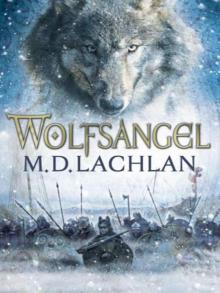 Wolfsangel
Wolfsangel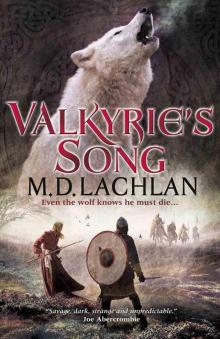 Valkyrie's Song
Valkyrie's Song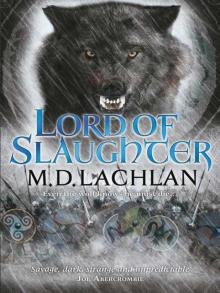 Lord of Slaughter
Lord of Slaughter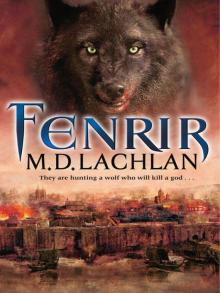 Fenrir c-2
Fenrir c-2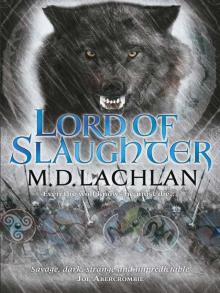 Lord of Slaughter (Claw Trilogy 3)
Lord of Slaughter (Claw Trilogy 3)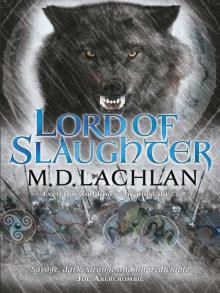 Lord of Slaughter c-3
Lord of Slaughter c-3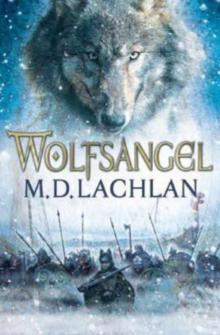 Wolfsangel c-1
Wolfsangel c-1